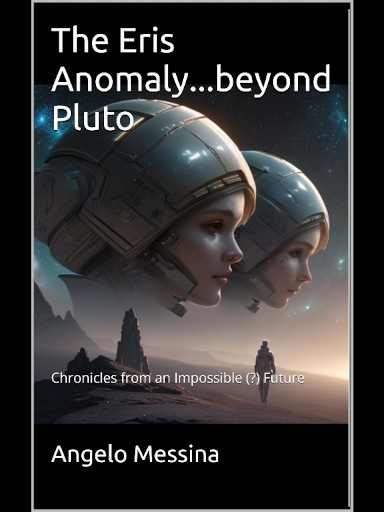
The novel “The Eris Anomaly…beyond Pluto” (“Il Mistero di Eris…oltre Plutone”) by Angelo Messina was published for the first time in 2023 and translated into English by the author in 2025.
Adam is traveling to the dwarf planet Eris to investigate a strange anomaly in its orbit. That journey represents an important milestone in a journey that began thirty years earlier, changing his life and leading him to have a growing influence on humanity.
Thirty years earlier, Adam was taking what he thought was a normal walk in the woods when he found himself in a completely different place. There, he begins a contact with an object that seems to possess a consciousness and progressively increases his mental abilities, allowing him to develop technologies useful to humanity, but only if he manages to avoid certain negative tendencies.
“The Eris Anomaly…beyond Pluto” takes us to a future that, at the beginning of the novel, is near, and therefore to a world full of problems we can easily understand. I’m not usually a fan of a work with a prologue set in the middle of the story, but I must say that Angelo Messina chose a moment that proves truly pivotal to the plot and clarifies the connection with the beginning of Adam’s adventure.
The subtitle “Chronicles from an Impossible (?) Future” conveys the possibilities, or impossibilities, that the future holds for humanity. It seems that external help is needed to prevent humanity from becoming stuck in stupid ape behavior: according to the author, this help comes in the form of a strange object the protagonist comes into contact with. Reading that part while listening to Richard Strauss’s “Thus Spoke Zarathustra” probably makes it more evocative.
In this novel, Adam’s contact with the object he calls the Totem continues over time. The first part of the story is an attempt to build a utopia by using scientific and technological advances to offer solutions to humanity’s problems. This also concerns inner problems, using new psychological techniques to restore mental balance to the people who lack it.
Angelo Messina includes many scientific and technological elements, though he doesn’t hinder them with detailed descriptions, just including what’s necessary to emphasize how they can be useful to human beings. In all of this, the most science-fiction-like part seemed to me to be that Adam and his collaborators find themselves wielding immense power thanks to the technologies they develop and actually use it for good. If George Orwell were writing “1984” today, he would describe similar technologies being used for population control instead.
In constructing a utopia, Angelo Messina seeks to avoid references to existing systems and ideologies, with the explicit aim of moving beyond them and creating something new. The goal is to enable people to have true individual freedom, which is limited only when it encroaches on someone else’s freedom. This becomes possible in a post-scarcity society where technology enables humans to pursue their own interests and fulfill themselves, rather than being forced to work simply to survive.
The plot goes beyond a global utopia, at a certain point taking on a cosmic dimension that also includes some spiritual elements. Eris, the dwarf planet whose orbit is far beyond that of Pluto, becomes important, which explains the meaning of the novel’s title. Angelo Messina offers some thought-provoking insights into the broader reality that may exist beyond Earth. This is the part that offers the greatest amount of surprises and twists.
In a time when dystopias seem to dominate literature and global trends seem to be leading us in that direction, a utopian novel may seem wishful thinking and even naive. However, Angelo Messina offers food for thought on the possibilities that could open up if new technologies were put to the service of humanity rather than being used to further exploit it.
In the end, the human factor is what makes a utopian future possible or impossible, and it’s up to us to decide whether to behave as sentient beings. “The Eris Anomaly…beyond Pluto” includes outside help to guide humanity toward a positive future beyond all tribalism, but we’ll likely have to fend for ourselves. If you’re interested in gaining an insight into this impossibility (?), I recommend this novel. It’s available on Amazon USA, UK, and Canada.

